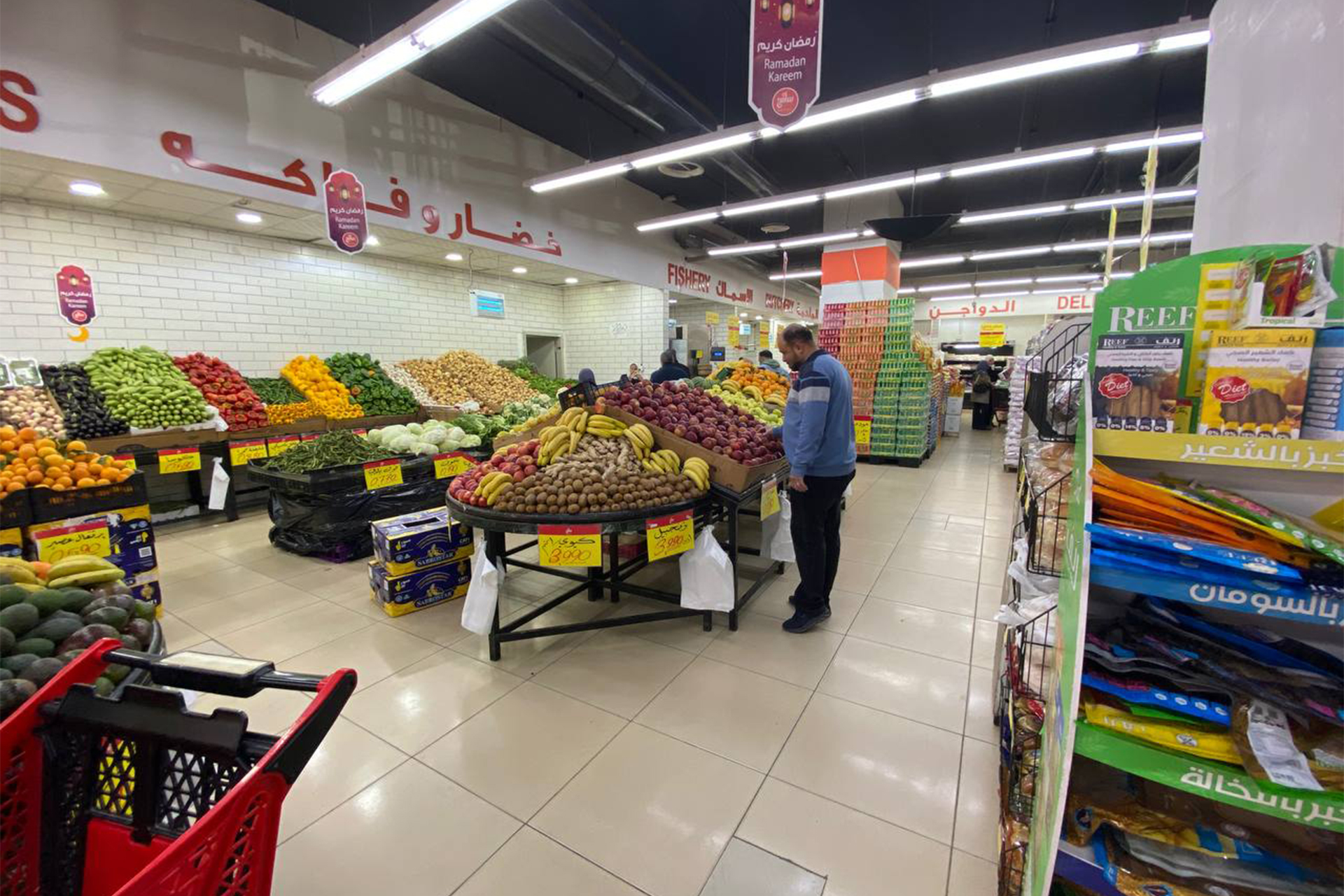High prices prevented Jordanians from buying (Al Jazeera)
Amman -
“I work in a sweets shop for a monthly salary of 260 dinars ($366), and this amount is not enough for the middle of the month at best, as there are necessary family obligations that do not stop, and things become more difficult during the month of Ramadan, which means additional financial burdens. This is with the rapid rise in the prices of food commodities,” said the young man, Baraa Matar, expressing his concern about the difficult living and economic conditions in which he lives.
The situation of Matar, who supports a family of four, is not much different from the situation of thousands of families in Jordan. This is Mai Al-Khalayleh, an employee in a tourism and travel company, who receives a monthly salary of 320 dinars ($451), despite her experience of more than 5 years. Years.
She added in her interview with Al Jazeera Net that her fixed salary is the only fixed salary in the economic equation in Jordan. Prices are increasing rapidly, and living conditions are more difficult every year than the one before, and there seems to be no hope of relief soon, she said.
Lubna Saadeh (a housewife) says that her husband’s salary during the month of Ramadan is only enough for the first ten days of the month of fasting, as every year, which forces the husband to go into debt in order to meet the basic needs of the house, especially meat and vegetables, in addition to the necessity of holding banquets. Ramadan for some relatives, which increases the burden on our shoulders.
She added to Al Jazeera Net that the crisis living conditions made their purchasing power disproportionate to current prices.
A significant increase in prices witnessed in Jordanian markets (Al Jazeera)
Low wages
The majority of Jordanians do not hesitate to air their complaints with the advent of the month of Ramadan, as following news related to the rise in the prices of many basic commodities, such as vegetables, chicken, meat, and rice, has become a priority over others, and the month of Ramadan has become a renewed occasion for Jordanians to raise their voices loudly again to demand raising the minimum wage (260 Dinar) despite the government's recent decision not to raise it until 2025.
The spokesman for the Jordanian Ministry of Labor, Muhammad Al-Zyoud, confirms that “determining the minimum wage is within the powers of the tripartite committee stipulated in Article 52 of the Labor Law, which is composed of representatives of the Ministry of Labor, representatives of employers, and workers.”
He added to Al Jazeera Net, "The last decision issued by the tripartite committee was in February 2023, in which it decided to maintain the minimum wage at (260) dinars for the years 2023-2024, provided that the minimum wage will be discussed by the committee at the beginning of the days." The first ten days of next year, 2025, to be recalculated so that the minimum wage is increased by adding inflation rates for the years 2022-2024.
The Jordanian Labor Observatory had indicated that the agreement... ratified by Jordan obligated the committee concerned with setting the minimum wage in each member state to review it periodically for periods not exceeding one year to keep pace with the standard of living. However, the minimum wage in the country has remained the same since In 2021, its lifting was postponed until 2025.
Baraa Matar confirms that Ramadan increases the economic burden on his family (Al Jazeera)
According to the Observatory, this contradicts the pillars of the economic modernization vision announced by the government in 2022, especially the pillar of “improving the quality of life,” which includes providing the necessary elements for a decent life.
The government Department of General Statistics announced a few days ago that inflation for the year 2023 increased by 2.08% compared to the year 2022, and among the most prominent basic commodities affected by the high prices are chicken, meat, dairy, rice, sugar, some oils, and other basic materials.
Economist Dr. Hossam Ayesh says, “The increase in demand for food commodities at the beginning of the month of Ramadan every year necessarily leads to an increase in their prices.”
He added in his interview with Al Jazeera Net that the Jordanian consumer is afraid today of the rise in commodity prices, in light of the continuing security tensions in the
Bab al-Mandab Strait.
Ayesh points out that Jordan was affected by security tensions in the region, and with the continuation of the war on the Gaza Strip, transportation costs increased, pushing prices to rise.
Poverty rates
According to estimates issued by the “2023 Atlas of Sustainable Development Goals” report, the number of poor people in Jordan is about 3 million and 980 thousand people (about 35% of the population), based on data on the national poverty line for every country in the world, which is set per capita in Jordan at 7. $9 per day.
Jordan imports 80% of its food needs from abroad, at an annual cost exceeding $4 billion, according to official estimates, which believe that the rise in commodity prices in the Kingdom, especially basic ones, is closely linked to the rise in foreign prices, which reinforces citizens’ fears of successive price increases.
Source: Al Jazeera

